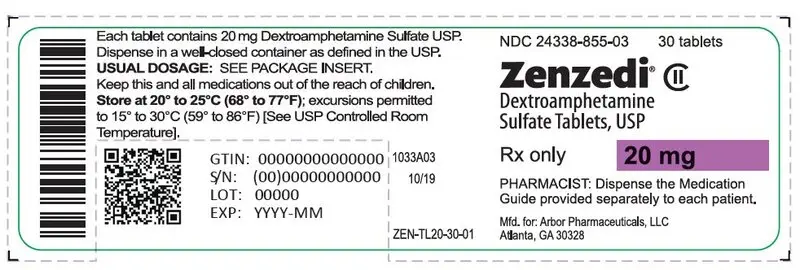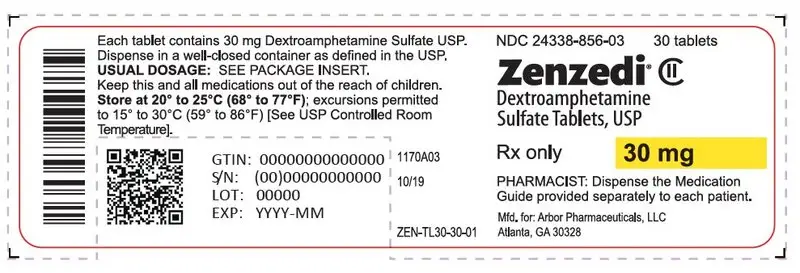Drug Detail:Zenzedi (Dextroamphetamine [ dex-tro-am-fet-a-meen ])
Drug Class: CNS stimulants
WARNING
AMPHETAMINES HAVE A HIGH POTENTIAL FOR ABUSE. ADMINISTRATION OF AMPHETAMINES FOR PROLONGED PERIODS OF TIME MAY LEAD TO DRUG DEPENDENCE AND MUST BE AVOIDED. PARTICULAR ATTENTION SHOULD BE PAID TO THE POSSIBILITY OF SUBJECTS OBTAINING AMPHETAMINES FOR NON-THERAPEUTIC USE OR DISTRIBUTION TO OTHERS, AND THE DRUGS SHOULD BE PRESCRIBED OR DISPENSED SPARINGLY.
MISUSE OF AMPHETAMINES MAY CAUSE SUDDEN DEATH AND SERIOUS CARDIOVASCULAR ADVERSE EVENTS.
Zenzedi - Clinical Pharmacology
Amphetamines are non-catecholamine, sympathomimetic amines with CNS stimulant activity. Peripheral actions include elevations of systolic and diastolic blood pressures and weak bronchodilator and respiratory stimulant action.
There is neither specific evidence which clearly establishes the mechanism whereby amphetamines produce mental and behavioral effects in children, nor conclusive evidence regarding how these effects relate to the condition of the central nervous system.
Contraindications
Advanced arteriosclerosis, symptomatic cardiovascular disease, moderate to severe hypertension, hyperthyroidism, known hypersensitivity or idiosyncrasy to the sympathomimetic amines, glaucoma.
Agitated states.
Patients with a history of drug abuse.
During or within 14 days following the administration of monoamine oxidase inhibitors (hypertensive crises may result).
Warnings
Serious Cardiovascular Events
Overdosage
Individual patient response to amphetamines varies widely. While toxic symptoms occasionally occur as an idiosyncrasy at doses as low as 2 mg, they are rare with doses of less than 15 mg; 30 mg can produce severe reactions, yet doses of 400 to 500 mg are not necessarily fatal.
In rats, the oral LD50 of dextroamphetamine sulfate is 96.8 mg/kg.
Manifestations of acute overdosage with amphetamines include restlessness, tremor, hyperreflexia, rhabdomyolysis, rapid respiration, hyperpyrexia, confusion, assaultiveness, hallucinations, panic states.
Fatigue and depression usually follow the central stimulation.
Cardiovascular effects include arrhythmias, hypertension or hypotension and circulatory collapse. Gastrointestinal symptoms include nausea, vomiting, diarrhea and abdominal cramps. Fatal poisoning is usually preceded by convulsions and coma.
Medication Guide
Zenzedi® (zen-ZED-ee)
(dextroamphetamine sulfate tablets, USP) CII
Read the Medication Guide that comes with Zenzedi before you or your child starts taking it and each time you get a refill. There may be new information. This Medication Guide does not take the place of talking to your doctor about your or your child's treatment with Zenzedi.
|
What is the most important information I should know about Zenzedi? The following have been reported with use of Zenzedi and other stimulant medicines.
Tell your doctor if you or your child have any heart problems, heart defects, high blood pressure, or a family history of these problems. Your doctor should check you or your child carefully for heart problems before starting Zenzedi. Your doctor should check your or your child's blood pressure and heart rate regularly during treatment with Zenzedi. Call your doctor right away if you or your child has any signs of heart problems such as chest pain, shortness of breath, or fainting while taking Zenzedi.
Tell your doctor about any mental problems you or your child have, or about a family history of suicide, bipolar illness, or depression. Call your doctor right away if you or your child have any new or worsening mental symptoms or problems while taking Zenzedi, especially seeing or hearing things that are not real, believing things that are not real, or are suspicious.
Tell your doctor if you have or your child has numbness, pain, skin color change, or sensitivity to temperature in your fingers or toes. Call your doctor right away if you have or your child has any signs of unexplained wounds appearing on fingers or toes while taking Zenzedi. Zenzedi may not be right for you or your child. Before starting Zenzedi tell your or your child's doctor about all health conditions (or a family history of) including:
|
What is Zenzedi?
Zenzedi is a central nervous system stimulant prescription medicine. It is used for the treatment of Attention Deficit Hyperactivity Disorder (ADHD).
Zenzedi may help increase attention and decrease impulsiveness and hyperactivity in patients with ADHD.
Zenzedi should be used as a part of a total treatment program for ADHD that may include counseling or other therapies.
Zenzedi is also used in the treatment of a sleep disorder called narcolepsy.
|
Zenzedi is a federally controlled substance (CII) because it can be abused or lead to dependence. Keep Zenzedi in a safe place to prevent misuse and abuse. Selling or giving away Zenzedi may harm others, and is against the law. Tell your doctor if you or your child have (or have a family history of) ever abused or been dependent on alcohol, prescription medicines or street drugs. |
Who should not take Zenzedi?
Zenzedi should not be taken if you or your child:
- Have heart disease or hardening of the arteries
- Have moderate to severe high blood pressure
- Have hyperthyroidism
- Have an eye problem called glaucoma
- Are very anxious, tense, or agitated
- Have a history of drug abuse
- Are taking or have taken within the past 14 days an antidepression medicine called a monoamine oxidase inhibitor or MAOI.
- Is sensitive to, allergic to, or had a reaction to other stimulant medicines
Zenzedi is not recommended for use in children less than 3 years old.
Zenzedi may not be right for you or your child. Before starting Zenzedi tell your or your child's doctor about all health conditions (or a family history of) including:
- Heart problems, heart defects, high blood pressure
- Mental problems including psychosis, mania, bipolar illness, or depression
- Tics or Tourette's syndrome
- Thyroid problems
- Seizures or have had an abnormal brain wave test (EEG)
Tell your doctor if you or your child is pregnant, planning to become pregnant, or breastfeeding.
Can Zenzedi be taken with other medicines?
Tell your doctor about all of the medicines that you or your child take including prescription and nonprescription medicines, vitamins, and herbal supplements. Zenzedi and some medicines may interact with each other and cause serious side effects. Sometimes the doses of other medicines will need to be adjusted while taking Zenzedi.
Your doctor will decide whether Zenzedi can be taken with other medicines.
Especially tell your doctor if you or your child take:
- Antidepression medicines including MAOIs
- Blood pressure medicines
- Antacids
- Seizure medicines
Know the medicines that you or your child take. Keep a list of your medicines with you to show your doctor and pharmacist.
Do not start any new medicine while taking Zenzedi without talking to your doctor first.
How should Zenzedi be taken?
- Take Zenzedi exactly as prescribed. Your doctor may adjust the dose until it is right for you or your child.
- Zenzedi is usually taken two or three times a day. The first dose is usually taken in the morning. One or two more doses may be taken during the day, 4 to 6 hours apart.
- From time to time, your doctor may stop Zenzedi treatment for a while to check ADHD symptoms.
- Your doctor may do regular checks of the blood, heart, and blood pressure while taking Zenzedi. Children should have their height and weight checked often while taking Zenzedi. Zenzedi treatment may be stopped if a problem is found during these check-ups.
- If you or your child take too much Zenzedi or overdoses, call your doctor or poison control center right away, or get emergency treatment.
What are possible side effects of Zenzedi?
See "What is the most important information I should know about Zenzedi?" for information on reported heart and mental problems.
Other serious side effects include:
- Slowing of growth (height and weight) in children
- Seizures, mainly in patients with a history of seizures
- Eyesight changes or blurred vision
- Serotonin syndrome. A potentially life-threatening problem called serotonin syndrome can happen when medicines such as Zenzedi are taken with certain other medicines. Symptoms of serotonin syndrome may include:
- agitation, hallucinations, coma or other changes in mental status
- problems controlling your movements or muscle twitching
- fast heartbeat
- high or low blood pressure
- sweating or fever
- nausea or vomiting
- diarrhea
- muscle stiffness or tightness
Common side effects include:
- Fast heart beat
- Tremors
- Trouble sleeping
- Stomach upset
- Dry mouth
- Decreased appetite
- Headache
- Dizziness
- Weight loss
Zenzedi may affect your or your child's ability to drive or do other dangerous activities.
Talk to your doctor if you or your child have side effects that are bothersome or do not go away.
This is not a complete list of possible side effects. Ask your doctor or pharmacist for more information. Call your doctor for more medical advice about side effects. You may report side effects to Arbor Pharmaceuticals, LLC, Medical Information at 1-866-516-4950 or FDA at 1-800-FDA-1088.
How should I store Zenzedi?
- Store Zenzedi in a safe place at room temperature, 20° to 25°C (68° to 77°F).
- Keep Zenzedi and all medicines out of the reach of children.
General information about Zenzedi
Medicines are sometimes prescribed for purposes other than those listed in a Medication Guide. Do not use Zenzedi for a condition for which it was not prescribed. Do not give Zenzedi to other people, even if they have the same condition. It may harm them and it is against the law.
This Medication Guide summarizes the most important information about Zenzedi. If you would like more information, talk with your doctor. You can ask your doctor or pharmacist for information about Zenzedi that was written for healthcare professionals. For more information about Zenzedi you may also contact Arbor Pharmaceuticals, LLC at 1-866-516-4950.
What are the ingredients in Zenzedi?
Active Ingredient: dextroamphetamine sulfate
Inactive Ingredients: colloidal silicon dioxide, crospovidone, microcrystalline cellulose and stearic acid. The 5 mg tablets contain D&C Red #27 and FD&C Yellow #6. The 7.5 mg tablets contain FD&C Blue #1 and D&C Yellow #10. The 10 mg tablets contain FD&C Red #40, FD&C Yellow #6 and FD&C Blue #2. The 15 mg tablets contain FD&C Blue #1, FD&C Blue #2, and FD&C Red #40. The 20 mg tablets contain FD&C Blue #1 and D&C Red #27. The 30 mg tablets also contain D&C Yellow #10.
This Medication Guide has been approved by the U.S. Food and Drug Administration.
Manufactured
for Arbor Pharmaceuticals, LLC, Atlanta, GA 30328.
Rev. 01/19
ZEN-MG-06
| ZENZEDI
dextroamphetamine sulfate tablet |
||||||||||||||||||||
|
||||||||||||||||||||
|
||||||||||||||||||||
|
||||||||||||||||||||
|
||||||||||||||||||||
|
||||||||||||||||||||
|
||||||||||||||||||||
| ZENZEDI
dextroamphetamine sulfate tablet |
||||||||||||||||||||
|
||||||||||||||||||||
|
||||||||||||||||||||
|
||||||||||||||||||||
|
||||||||||||||||||||
|
||||||||||||||||||||
|
||||||||||||||||||||
| ZENZEDI
dextroamphetamine sulfate tablet |
||||||||||||||||||||
|
||||||||||||||||||||
|
||||||||||||||||||||
|
||||||||||||||||||||
|
||||||||||||||||||||
|
||||||||||||||||||||
|
||||||||||||||||||||
| ZENZEDI
dextroamphetamine sulfate tablet |
||||||||||||||||||||
|
||||||||||||||||||||
|
||||||||||||||||||||
|
||||||||||||||||||||
|
||||||||||||||||||||
|
||||||||||||||||||||
|
||||||||||||||||||||
| ZENZEDI
dextroamphetamine sulfate tablet |
||||||||||||||||||||
|
||||||||||||||||||||
|
||||||||||||||||||||
|
||||||||||||||||||||
|
||||||||||||||||||||
|
||||||||||||||||||||
|
||||||||||||||||||||
| ZENZEDI
dextroamphetamine sulfate tablet |
||||||||||||||||||||
|
||||||||||||||||||||
|
||||||||||||||||||||
|
||||||||||||||||||||
|
||||||||||||||||||||
|
||||||||||||||||||||
|
||||||||||||||||||||
| ZENZEDI
dextroamphetamine sulfate tablet |
||||||||||||||||||||
|
||||||||||||||||||||
|
||||||||||||||||||||
|
||||||||||||||||||||
|
||||||||||||||||||||
|
||||||||||||||||||||
|
||||||||||||||||||||
| Labeler - Arbor Pharmaceuticals, Inc. (781796417) |



















